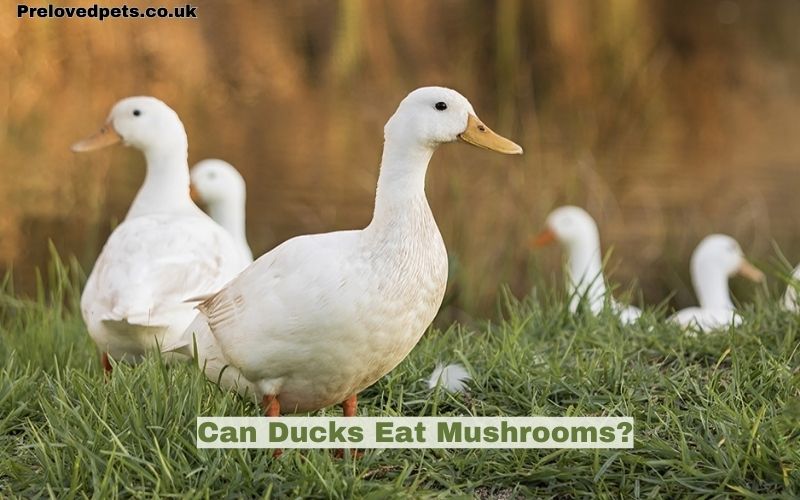Ducks are charming, sociable birds that are often found in backyard ponds, local parks, or even kept as pets. If you’re a duck owner or simply curious about the dietary habits of these birds, you might have wondered, “Can ducks eat mushrooms?” The question is more complex than it appears at first glance. Understanding whether mushrooms are safe for ducks involves delving into the types of mushrooms available, the potential risks and benefits, and the overall dietary needs of ducks.
Understanding Duck Nutrition
Ducks are omnivores, which means they have a varied diet that includes both plant and animal matter. In the wild, ducks consume a mixture of aquatic plants, small fish, insects, worms, and grains. Domesticated ducks have similar dietary needs and are usually fed a balanced diet of duck pellets, grains, vegetables, and occasional treats.
Nutritional Requirements of Ducks:
- Proteins: Essential for growth, feather development, and egg production.
- Carbohydrates: Provide energy and are found in grains like corn and wheat.
- Fats: Necessary for energy storage, especially during colder months.
- Vitamins and Minerals: Critical for overall health, including vitamin A, D, E, and minerals like calcium and phosphorus.
While ducks can eat a variety of foods, it’s important to understand the nutritional content and safety of each item before introducing it to their diet.
Types of Mushrooms: Edible vs. Toxic
Mushrooms are a type of fungi, and they come in many varieties. Some mushrooms are edible and even nutritious, while others are toxic and can be deadly if ingested.
Common Edible Mushrooms:
- White Button Mushrooms: These are the most common type of mushroom found in grocery stores. They are low in calories and contain some vitamins and minerals.
- Cremini Mushrooms: A slightly older version of the white button mushroom, with a deeper flavor.
- Portobello Mushrooms: Mature cremini mushrooms that are often used as a meat substitute due to their texture.
- Shiitake Mushrooms: Known for their rich flavor and potential health benefits, including immune support.
Toxic Mushrooms:
- Amanita phalloides (Death Cap): One of the most poisonous mushrooms in the world, responsible for the majority of mushroom poisoning deaths.
- Amanita muscaria (Fly Agaric): Recognizable by its bright red cap with white spots, it contains toxins that can cause hallucinations and other severe symptoms.
- Galerina marginata (Deadly Galerina): Often mistaken for edible mushrooms, this species contains amatoxins, which are lethal.
- Lepiota (False Parasol): Contains similar toxins to the death cap and can be deadly if ingested.
While humans can usually differentiate between edible and toxic mushrooms, ducks and other animals do not have this ability. This makes it crucial for their caregivers to understand the risks associated with feeding them mushrooms.
Can Ducks Safely Eat Edible Mushrooms?
Edible Mushrooms in a Duck’s Diet:
Edible mushrooms, like white button mushrooms or shiitake mushrooms, are generally safe for ducks to eat in small quantities. These mushrooms are not toxic and can provide some nutritional benefits, such as vitamins B and D, antioxidants, and a small amount of protein.
However, the overall nutritional value of mushrooms is relatively low compared to other foods that ducks commonly eat. For example, leafy greens, grains, and insects provide more of the essential nutrients that ducks need. Therefore, while ducks can eat edible mushrooms, they should only be offered as an occasional treat rather than a staple part of their diet.
Nutritional Considerations:
Mushrooms are mostly water, with minimal amounts of protein, carbohydrates, and fats. Ducks require a balanced diet that provides sufficient protein and energy, particularly for egg-laying ducks. While mushrooms can be a fun treat, they should not replace other foods that are more nutritionally dense.
Risks of Feeding Ducks Mushrooms
Potential Risks of Mushrooms:
- Toxicity Concerns: The primary risk of feeding mushrooms to ducks is the potential for toxicity. Many wild mushrooms are poisonous, and even experienced foragers can sometimes mistake a toxic species for an edible one. If ducks consume toxic mushrooms, the consequences can be severe, including death.
- Digestive Issues: Ducks have delicate digestive systems, and unfamiliar foods can sometimes cause gastrointestinal upset. While edible mushrooms are not inherently harmful, they might still cause digestive issues in some ducks, particularly if given in large quantities or if the ducks are not accustomed to eating them.
- Risk of Contamination: Mushrooms, like other produce, can carry harmful bacteria or pesticides if not properly cleaned. This is especially true for wild mushrooms, which might have been exposed to pollutants or animal waste.
Signs of Mushroom Poisoning in Ducks
If a duck consumes a toxic mushroom, it is critical to recognize the signs of poisoning and act quickly. Mushroom poisoning can manifest in various ways, depending on the type and quantity of the mushroom ingested.
Common Symptoms of Mushroom Poisoning in Ducks:
- Gastrointestinal Distress: Vomiting, diarrhea, or severe abdominal pain.
- Neurological Symptoms: Lethargy, weakness, uncoordinated movements, or seizures.
- Respiratory Issues: Difficulty breathing or rapid, shallow breathing.
- Behavioral Changes: Unusual behavior, such as excessive thirst, agitation, or disorientation.
These symptoms can appear within hours of ingestion, but in some cases, they might take several days to develop. It is crucial to seek veterinary care as soon as possible if you suspect a duck has eaten a toxic mushroom.
What to Do If a Duck Eats a Toxic Mushroom
If you suspect that a duck has ingested a toxic mushroom, it’s important to act quickly to minimize the damage. Mushroom poisoning can be fatal, but prompt action can save your duck’s life.
Steps to Take:
- Remove the Duck from the Area: If possible, identify the mushroom that was ingested and remove any remaining pieces from the environment to prevent further consumption.
- Contact a Veterinarian: Reach out to a veterinarian who has experience with birds, and describe the situation, including the type of mushroom ingested if known. The vet may instruct you to bring the duck in for treatment or provide guidance on supportive care at home.
- Provide Supportive Care: While waiting for veterinary assistance, keep the duck calm and hydrated. Avoid giving any home remedies or inducing vomiting unless specifically instructed by the veterinarian, as this could cause further harm.
- Monitor the Duck: Keep a close eye on the duck’s behavior and symptoms. Be prepared to provide the veterinarian with details about any changes in the duck’s condition.
Read Also: Can Ducks Eat Grapes?
Safer Food Alternatives for Ducks
If you’re looking for safe and nutritious foods to feed ducks, there are plenty of alternatives to mushrooms that can provide the necessary nutrients and keep your ducks healthy.
Safe Foods for Ducks:
- Leafy Greens: Lettuce, kale, spinach, and dandelion greens are excellent sources of vitamins and minerals.
- Grains: Corn, oats, barley, and wheat are energy-rich foods that ducks enjoy.
- Vegetables: Peas, carrots, and cucumbers are safe and nutritious for ducks.
- Fruits: Apples, berries, and melons can be given as treats in moderation.
- Insects and Worms: Mealworms, earthworms, and small fish provide protein and are a natural part of a duck’s diet.
These foods not only meet the nutritional needs of ducks but also encourage natural foraging behavior, which is important for their mental and physical well-being.
FAQs
Can ducks eat mushrooms?
Yes, ducks can eat certain types of edible mushrooms, such as white button mushrooms, cremini mushrooms, and shiitake mushrooms. However, these should only be offered in small amounts and as an occasional treat. It’s important to avoid feeding ducks wild mushrooms or mushrooms that you are not 100% certain are safe.
Are mushrooms safe for ducks to eat regularly?
No, mushrooms should not be a regular part of a duck’s diet. While some edible mushrooms are safe in moderation, they do not provide significant nutritional benefits compared to other foods that ducks eat. Additionally, there is always a risk of accidentally feeding a toxic mushroom, which can be fatal.
What types of mushrooms are toxic to ducks?
Many wild mushrooms are toxic to ducks, including Amanita phalloides (Death Cap), Amanita muscaria (Fly Agaric), and Galerina marginata (Deadly Galerina). These mushrooms can cause severe poisoning and even death if ingested by ducks. It is safest to avoid feeding ducks any wild mushrooms.
What should I do if my duck eats a wild mushroom?
If you suspect that your duck has eaten a wild or toxic mushroom, it’s important to act quickly. Remove the duck from the area, contact a veterinarian immediately, and follow their instructions. Symptoms of mushroom poisoning can include vomiting, diarrhea, lethargy, and uncoordinated movements. Quick veterinary intervention is crucial.
Conclusion
While ducks can safely eat certain types of edible mushrooms, it’s generally not recommended to make mushrooms a regular part of their diet. The risks associated with feeding mushrooms, particularly the potential for toxicity and digestive issues, outweigh the minimal nutritional benefits they offer.
If you do choose to give your ducks mushrooms, make sure they are a safe, edible variety, and offer them in small quantities as an occasional treat. Always monitor your ducks for any signs of distress or illness after introducing new foods to their diet.
Ultimately, there are many other food options that are both safer and more beneficial for ducks. By providing a balanced and varied diet that meets their nutritional needs, you can ensure that your ducks remain healthy, happy, and thriving.




